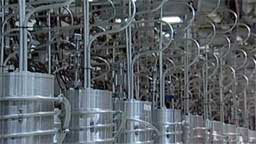Friday 25 January 2013
Kazakhstan Ready to Host Next Round of Talks on Iran’s Nuclear Program
Keywords:
ASTANA (Interfax-Kazakhstan) – Astana has proposed that the next meeting of the “six” international mediators for Iran’s Nuclear Program be held in Kazakhstan, says the Kazakh Ministry of Foreign Affairs.

- Centrifuges at Natanz uranium enrichment site in central Iran.
“When meeting with Iranian Foreign Minister Ali Akbar Salehi (in summer 2012), Kazakh President Nursultan Nazarbayev voiced the proposal,” Zhanbulat Usenov, the deputy head of the Committee for International Information at the Kazakh Foreign Ministry, told Interfax-Kazakhstan. “We remain committed to nuclear non-proliferation and invite the mediators to hold the next round of their talks in Kazakhstan,” Usenov said.
According to Reuters, the next round of talks between six major powers and Iran is now more likely to take place in February rather than January. European Union diplomats and Iranian officials have been holding discussions for months on arranging a new round of talks but EU officials say Iran has been stalling on fixing a date and location. The Iranian Students’ News Agency has reported that talks might resume on January 28 and 29 and that Tehran has suggested Cairo as the venue, but the EU has said there was no agreement.
The Kazakh proposition comes after China called for the resumption of talks between Iran and the P5+1 group of world powers to end the West’s standoff over Tehran’s nuclear energy program. “China hopes the involved parties can exercise their flexibility and hold the next round of consultations as early as possible,” Chinese Foreign Ministry spokesman Hong Lei said during a press conference in Beijing on Friday, Xinhua reported. “China has always believed the content of talks is far more important than the venue,” he added.
According to the Iranian semi-official PressTV, Tehran has announced that it welcomes the readiness of the six major world powers to hold constructive talks with Iran.
The United States, Israel and some of their allies have repeatedly accused Iran of pursuing non-civilian objectives in its nuclear energy program.

